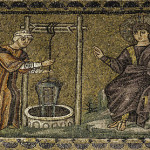We run our website the way we wished the whole internet worked: we provide high quality original content with no ads. We are funded solely by your direct support. Please consider supporting this project.
Eye for Eye: That Time Jesus Refuted An Old Testament Teaching
One of the most surprising aspects of Jesus’ teaching is that, while he clearly shared his contemporaries’ view of the Old Testament as inspired by God, he was nevertheless not afraid of repudiating it when he felt led by his Father to do so (Jn. 8:28; 12:49-50; 14:31). For example, while the OT commands people to make oaths in God’s name (Deut 6:13), Jesus forbids it (Mt 5:33-37). And, much more importantly for our purposes, while the OT commands an “eye for eye” and a “tooth for a tooth,” Jesus commanded people to “not resist an evil person. If anyone slaps you on the right cheek, turn to them the other cheek, also” (Mt 5:38-39).
Jesus’ repudiation of taking an “eye for an eye,” is explicitly commanded in the OT (e.g. Ex 21:24; Lev 24:19-20). Indeed, in Deuteronomy, the command is not merely about how much punishment is allowed; it’s about how much is required. “Show no pity,” the text states, “ life for life, eye for eye, tooth for tooth, hand for hand, foot for foot” (Deut 19:21). It thus seems that Jesus “freely admitted that his ethical teachings contrasted sharply with some of the ethical teachings in the Mosaic law.”[1]
In this light, Eugene Boring must be judged to be on the mark when he argues that this “juxtaposition is not to be softened,” for in this passage “Jesus does more than give a better interpretation of the old authority; he relocates authority from the written text of Scripture to himself – i.e., to God’s presence in his life, teaching, death, and resurrection…”[2] With Donald Hagner, we must agree that this example of Jesus’ “authoritative ‘but I say to you,’ is shocking in its contrast with the principle of justice defended by the OT texts.”[3] Yet, while this contrast is indeed shocking, it’s important we note that Jesus’ new “teaching is not [a] transgression of the Law, but its transcendence,” as Boring puts it.[4] Jesus repudiated aspects of the OT law not by encouraging people to break any laws, but by teaching and embodying a way of life that reflected the wholeness (teleios) of the Father (Mt. 5:48, cf. 17-20).
Nevertheless, it can’t be denied that this replacement is “shocking.” What is even more shocking than this contrast, however, is the absolute importance Jesus’ placed on adhering to it. Jesus commanded followers to love and serve enemies rather than adhere to the OT law “that you may be children of your Father in heaven” (Mt. 5:45, cf. Lk 6:35, emphasis added). For Jesus, embodying enemy-loving non-violence was the precondition for being considered a child of God. The stakes obviously could not be higher.
Yet, in replacing the “eye for an eye” command with his love command, Jesus is not merely repudiating three verses of the OT. He is, at least indirectly, undermining the inherent violence of all retributive laws in then OT. For the principle embodied in the “an eye for an eye” is not essentially different from the commandments to execute children who slander their parents, to cut off the hand of any woman who touches a man’s genitalia, and the like. His teaching, clearly, is quite at odds with a significant portion of the OT law.
One could go further, as does C. S. Cowles, and argue that Jesus’ teaching on enemy-loving non-violence “represents a total repudiation of Moses’ genocidal commands and stands in judgment on Joshua’s campaign of ethnic cleansing.”[5] Indeed, while it raises a host of interpretive issues which I am addressing in my forthcoming book The Crucifiction of the Warrior God, Jesus’ radical teaching on enemy-loving non-violence stands in tension with every OT narrative in which Yahweh is depicted as acting or sanctioning violence. For example, it’s significant that when James and John wanted to follow the precedent of Elijah and “call fire down from heaven to destroy” a Samaritan village, Jesus “rebuked” them and, according to many early manuscripts, told them; “You do not know what spirit you are of” (Lk. 9: 54-55; cf. 2 Kg 1:10, 12, 14). As shocking as it is, this episode clearly suggests that Jesus regarded Elijah’s enemy-destroying supernatural feat to be ungodly, if not demonic.
Whatever else we might say about all of this, if we take Jesus’ criteria for what qualifies one to be considered a child “of your Father in heaven” seriously, then it seems that anyone who acted in the violent way Moses, Joshua, Elijah and other OT heroes acted would be considered by Jesus to be disqualified from being considered a child of God. Obviously, in making this observation I’m not suggesting OT heroes weren’t “saved,” for Moses and Elijah appear with Jesus on the Mount of Transfiguration. I make it rather to simply note the remarkable extent to which Jesus turned significant portions of the OT upside-down with his radical teaching on enemy-loving non-violence.
[1] K. Sparks, Sacred Word, 105.
[2] M.E. Boring, “Matthew,” in The New Interpreter’s Bible, Vol VIII., ed. L. Keck (Nashville: Abingdon, 1995) 188.
[3] D. Hagner, Matthew 1-13: Word Biblical Commentary, Vol. 33A (Dallas, TX: Word Books, 1993), 180. See U. Luz, Matthew 1-7: A Commentary, trans. W. C. Linss (Minneapolis: Augsburg, 1989), 277-79.
[4] Boring, “Matthew,” 188.
[5] Cowles, “Case for Radical Discontinuity,” 33.
Category: General
Tags: Crucifixion of the Warrior God, Cruciform Theology, Jesus, Non-Violence
Topics: Christology, Following Jesus
Related Reading

Reflections on Divine Violence in the Old Testament
As some of you know, for the last five years I’ve been working on a book addressing the problem of divine violence in the OT. (For alleged violence in the NT, see Thomas R. Yoder Neufeld, Killing Enmity: Violence in the New Testament (Baker Academic, 2011). It will be a highly academic tome, approximately 600…

Religion that Blinds Us to God
For a variety of reasons, many Jews at the time of Jesus had come to believe that heaven had been closed since the writing of the last book of the Old Testament. God was distant and no longer active among his people. Their religion focused on holding fast to the law God had given in…

God is Different Than You Think
The revelation of “[a] God humiliated even unto the cross,” as Pascal put it, flies in the face of what most Jews of Jesus’ time, and of what most people throughout history, have expected God to be. In this light, we can discern the thematic centrality of the cross in Jesus’ many teachings that reverse…

A Revelation of Beauty Through Ugliness
In my recent post, Getting Honest About the Dark Side of the Bible, I enlisted no less an authority than John Calvin to support my claim that we need to be forthright in acknowledging that some of the portraits of God in the OT are, as he said, “savage” and “barbaric.” What else can we…

God’s Shadow Activity [Sermon 7/15/12]
If we believe the whole Bible is inspired, how do we reconcile the Old Testament with the self-sacrificial, enemy-loving God revealed in Jesus Christ? In this past Sunday’s sermon at Woodland Hills Church, Greg succinctly summarizes his own thoughts by echoing that of the apostle Paul: the Old Testament is a shadow of the reality which is found in Christ.

When Jesus Questioned the Father
Though the sinless Son of God had perfect faith, we find him asking God the Father to alter the plan to redeem the world through his sacrifice—if it is “possible” (Matt. 26:42). As the nightmare of experiencing the sin and God-forsakenness of the world was encroaching upon him, Jesus was obviously, and understandably struggling. So,…

